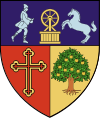Foleștii De Jos
Agriculture is the main source of income. There are special traditions which have been well preserved.
Neighbours
- Costești and Horezu to the north.
- Pietrari and Păușești to the east.
- Măldărești and Oteșani to the west.
- Frâncești to the south.
History
A 1453 document attests the existence of the village of Foleștii de Sus, while a 1536 one mentions the villages of Tomșani and Bogdănești.
Historical monuments
- "Three Holy Hierarchs" Church in Foleștii de Jos, built in 1767
- "Blessed Paraskevi" Church in Foleștii de Sus, built in 1757
- "Holy Archangels Michael and Gabriel" Church in Baltățeni, built in 1773–1774
Geography

The river Bistrița, a tributary of the Olt, passes through the commune from north to south. The topography of the area is made of the sub-Carpathian hills; the commune is at an altitude of about 650 m.
Economy
Unlike the majority of the Romanian countryside, collectivisation under Communism did not seriously affect Tomșani, with most farmers retaining their land. Most residents work in agriculture, particularly hay, fruit and apiculture.
Tomșani has easy access by road to the national and European system from the
- European route E81 (Bucharest–Râmnicu Vâlcea–Sibiu)
- DN 67 (Râmnicu Vâlcea–Costești–Horezu)
- DJ 646 (DN 64: Băbeni–Frâncești–Foleștii de Jos–Foleștii de Sus–Tomșani)
Natives
References
- ^ "Results of the 2020 local elections". Central Electoral Bureau. Retrieved 9 June 2021.
- ^ "Populaţia rezidentă după grupa de vârstă, pe județe și municipii, orașe, comune, la 1 decembrie 2021" (XLS). National Institute of Statistics.
